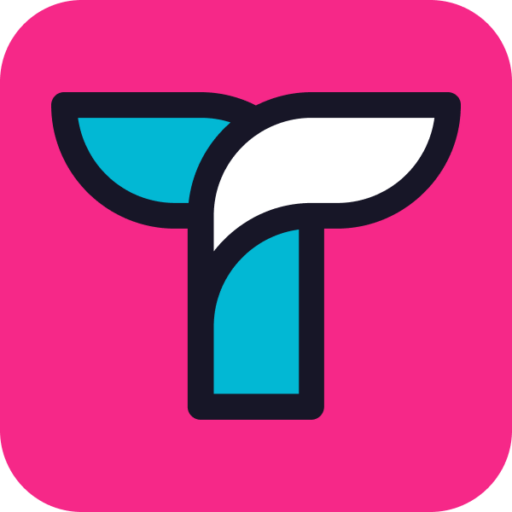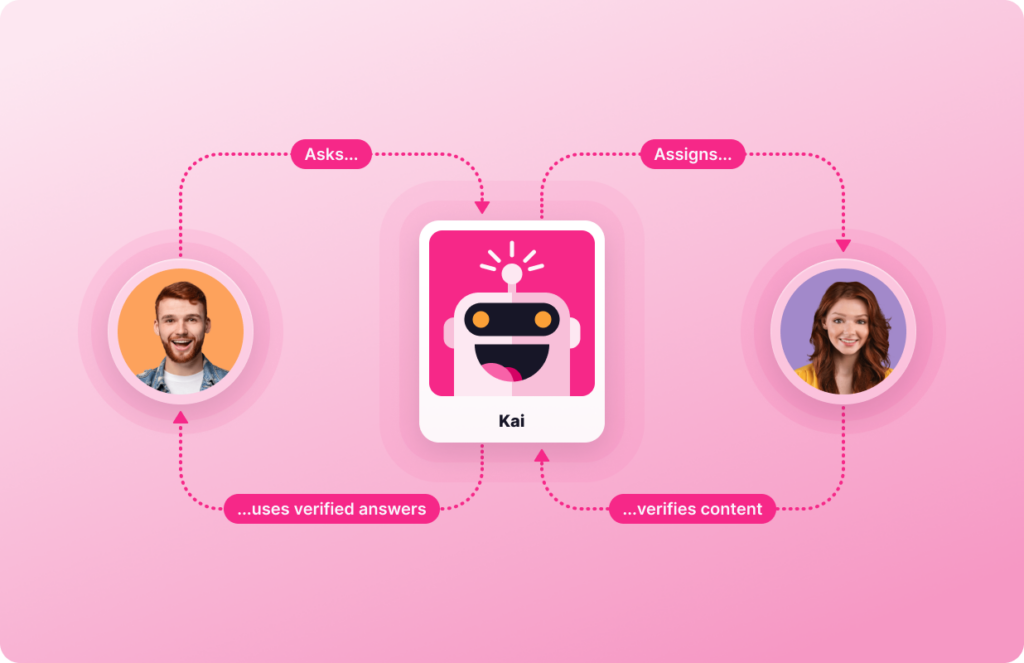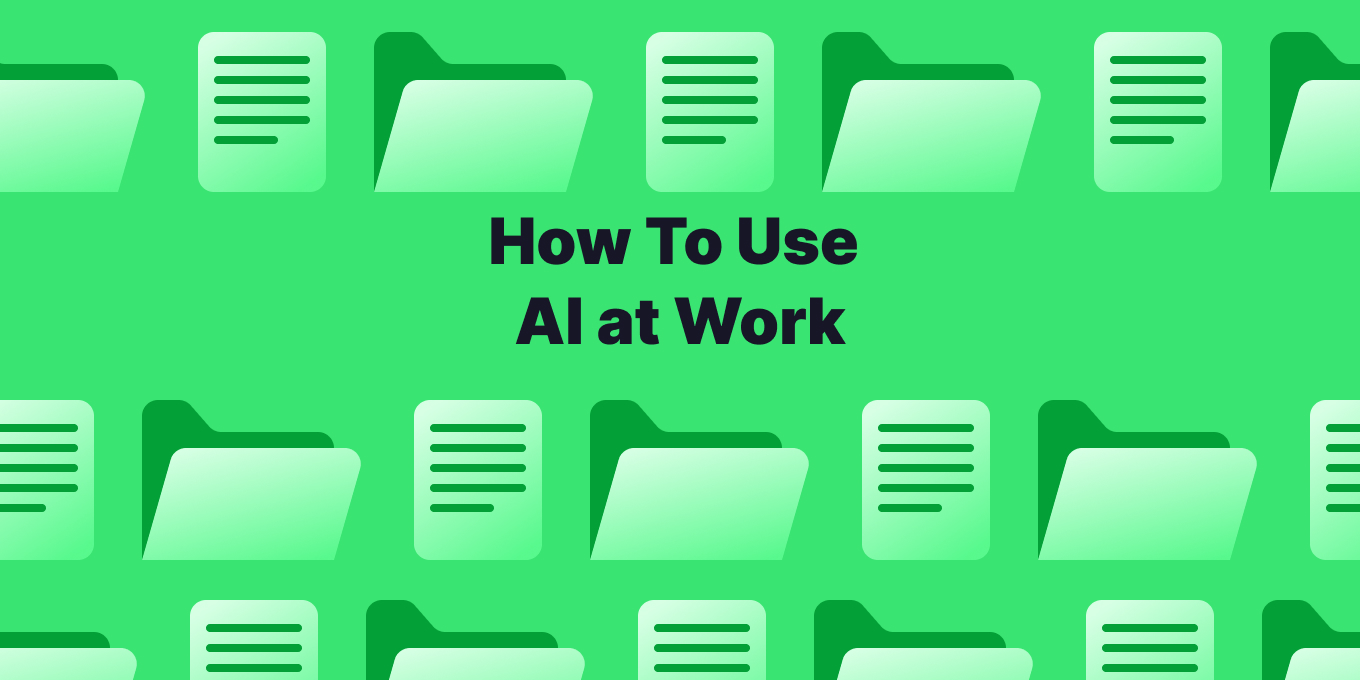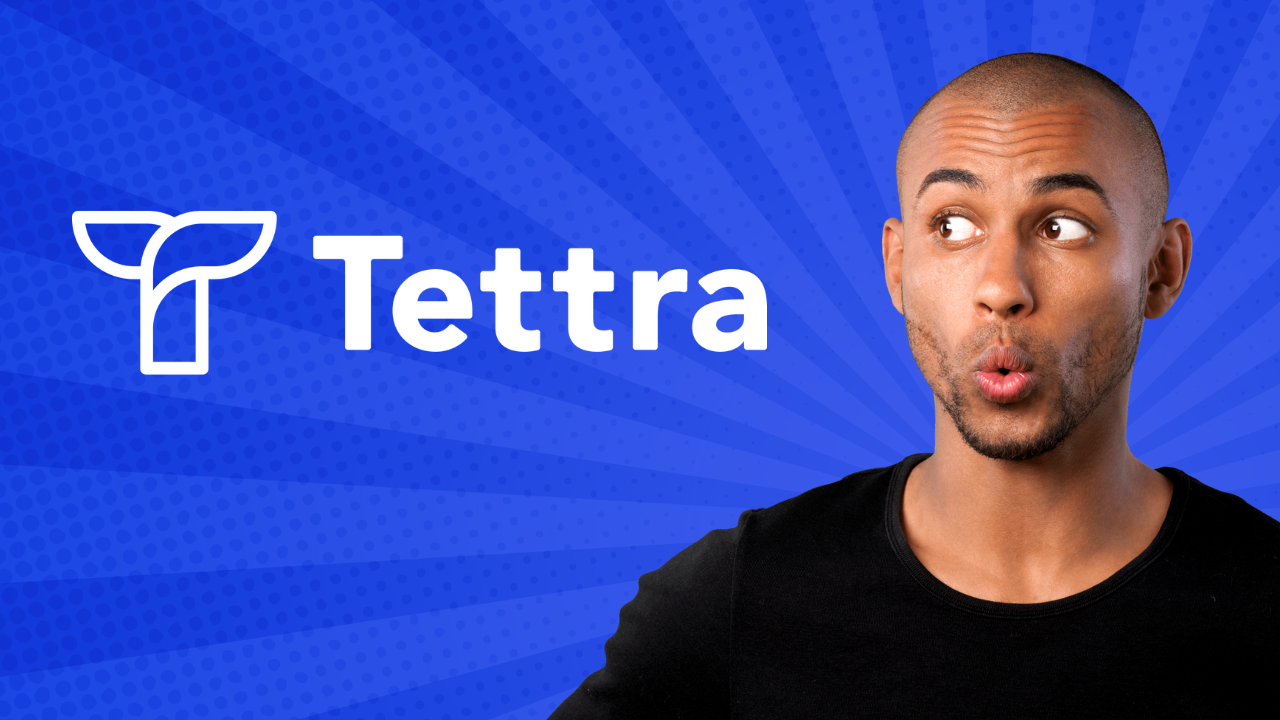Have you heard about AI? That’s a joke, right?
With the introduction of ChatGPT, Claude, Bard, MidJourney and many others, the 2020s have been dominated by the talk of artificial intelligence.
The workplace is not immune. Artificial intelligence (AI) is revolutionizing the workplace by automating repetitive tasks that were once time-consuming and tedious.
With AI, employees can focus on more complex operations, enhancing their effectiveness and productivity.
AI-powered business tools have the ability to carry out detailed tasks with unmatched precision and efficiency, resulting in significant cost savings for businesses.
Not surprisingly the, managers and company leaders are more fascinated by the possibilities of AI at work then the general, everyday worker.

Learn more about AI from Tettra:
According to a survey by the Boston Consulting Group:
- 62% of leaders are more optimistic about AI than frontline workers.
- Regular users of generative AI are more positive about it than non-workers
- 80% of leaders have used generative AI, while most workers have not
In theory, it should be obvious: By offloading mundane and repetitive tasks to AI systems, employees are able to shift their attention to higher-value activities that require human creativity and critical thinking.
But that shift isn’t easy for everyone.
The benefits of AI at work are clear – it leads to higher employee effectiveness, cost savings, improved productivity, and a more engaging and diverse workplace culture.
As businesses continue to adopt AI technologies, they can unlock new possibilities and drive innovation by leveraging the power of intelligent automation.
Note: A lot of the examples below are theoretical, though several AI capabilities in knowledge management (see Kai plus Tettra!) and personal productivity have already proven themselves to be true.
- Recommended: Best AI customer service tools and software
How can AI be used in the workplace?
1. Information retrieval and knowledge management
What AI Can Do:
- Automatic indexing and tagging of documents.
- Semantic search capabilities across vast data repositories.
- AI-powered recommendation systems suggesting related articles or information.
Tettra is one of the leading AI-powered knowledge management tools.
Tettra’s new AI assistant Kai is designed to help knowledge managers with three crucial tasks:

- Instantly answer repetitive questions in Tettra and Slack, or tap in an expert to answer. It’s like an automated AI answer generator
- Tag existing knowledge content with relevant topics, improving search results by making knowledge documents easy to find using plain language, and
- Preemptively generate reusable Frequently Asked Questions from your existing content to deflect future questions
These tasks are most likely to bog down knowledge managers, the team members who control and disseminate a company’s knowledge.
They’re repeatedly asked the same questions, forced to provide already-documented information that can’t be found in search, and always trying to stay one step ahead of their colleagues by creating the answers they know they’ll be asked sometime soon.
Not only does this take a toll on knowledge managers and team leads by diverting them from their other responsibilities, but it slows down the other team members who are constantly having to shoulder-tap their colleagues to get information.
The Tettra AI workflow solves for this. Learn more.
2. Decision support and analysis
- Predictive analytics to forecast business outcomes.
- Decision trees and AI models helping in making informed choices.
- Scenario analysis based on historical data.
3. Personal productivity
- Smart email filtering and prioritization.
- AI-driven task management that learns from user behavior.
- Virtual assistants scheduling meetings or answering routine queries.
4. Collaboration and communication
- Translating documents or conversations in real-time.
- Sentiment analysis on communication channels to gauge employee morale.
- Smart meeting schedulers optimizing for participant availability.
5. Learning and development
- Personalized learning paths based on individual’s performance and interests.
- AI tutors providing assistance on complex subjects.
- Real-time feedback during training sessions.
6. Automation of routine tasks
- Automatic data entry and basic reporting.
- Chatbots handling routine customer queries.
- Robotic process automation (RPA) and business automation streamlining administrative tasks.
7. Talent acquisition and management:
- AI-Powered Recruitment: Analyzing resumes and applications to shortlist candidates best suited for a role, based on qualifications and experience. By automating routine tasks, AI has the potential to reduce bias and discrimination, ensuring fair and equitable treatment for all employees — though as some studies have noted, it could also get worse. Additionally, AI technologies can provide personalized development opportunities and targeted feedback, leading to continuous growth and skill enhancement.
- Interview Assistance: Virtual interview platforms can gauge candidate responses, analyze facial expressions, and assess fitment using AI.
- Employee Retention Prediction: By analyzing employee behavior, feedback, and other metrics, AI can predict which employees are at risk of leaving, enabling proactive retention efforts.
8. Innovative product design & development
- Prototype Testing: Using AI to simulate how new products might function in real-world scenarios.
- Consumer Behavior Analysis: Predicting how customers will respond to new products or features.
- Optimized Product Iteration: AI can analyze feedback from multiple channels to suggest improvements or refinements in product designs.
9. Supply chain and logistics
- Demand Forecasting: Predicting product demand using historical data, trends, and other variables to optimize inventory.
- Route Optimization: Using AI algorithms to determine the most efficient routes for deliveries or transportation.
- Supplier Negotiations: AI can analyze vast amounts of data to provide recommendations on optimal pricing, quantities, and contract terms during negotiations with suppliers.
Try Tettra as your AI internal knowledge base for your customer support team
Tettra is the go-to tool for customer service teams who want to keep information organized and easy to find.
Here’s how your team can benefit from using Tettra:
- Centralized Knowledge: Store all your customer service info—FAQs, processes, and troubleshooting guides—in one spot, so your team always knows where to look.
- Better Team Collaboration: Share updates, solutions, and tips easily, so everyone stays on the same page and can help each other out.
- Faster Customer Responses: With everything in one place, your team spends less time searching for answers and more time helping customers, improving satisfaction and productivity.
- Easy Content Creation: Your team can quickly document new solutions and updates, keeping your knowledge base current without any hassle.
- Works with Your Tools: Tettra integrates with the tools you’re already using, like Slack and Google Drive, so your team can get what they need without breaking their flow.
- Simple, Organized Layout: Keep everything neat and searchable, making it a breeze for agents to find what they need, even during busy customer interactions.


